When you think of South Africa, several things come to mind. A country full of different cultures, beautiful landscapes and diverse flora and fauna.
It is not for nothing that South Africa has long been a popular destination not only for tourists, but also for volunteers from all over the world. Many Europeans, in particular, are drawn to the country to contribute their time and skills – including those of sports volunteers – to various projects and communities.
Although South Africa offers incredible opportunities and enriching experiences for volunteers, it is important to prepare well for your trip, especially if you are planning to support a sports project in disadvantaged regions.
Sport is helping to build a better future for young people in South Africa.
Before your sports volunteering trip to South Africa
Before embarking on your sports volunteering journey in South Africa, it is important to understand the social and cultural characteristics of the country. South Africa is often referred to as the “Rainbow Nation” because of the diverse ethnic groups, languages and traditions that make up its population. Different skin colours, religious rites, tribal affiliations and cultural backgrounds contribute to a vibrant diversity in the country that you should respect and engage with as a volunteer.
By respecting the local culture and adapting to the circumstances, you can make an important contribution while gaining a deeper understanding of this beautiful country and its people. Remember that your contribution, however small, can help empower disadvantaged communities and create a better future for South Africa’s youth. Embrace this opportunity with an open heart and a sense of adventure. We are sure you will return with memories and experiences that will last a lifetime.
One of the most important aspects of volunteering – especially in rural South Africa – is the opportunity for cultural integration. You will live and work with the locals and have the unique opportunity to learn about their way of life and traditions. Take advantage of this opportunity as it is also a valuable part of volunteering abroad.
Volunteering with sports programmes in South Africa can be an enriching and life-changing experience. You will have the opportunity to make a difference in disadvantaged communities by using sport as a powerful tool for positive change.
Inspiration through cultural diversity: tips for meaningful connections and positive impact
South Africa is rich in cultures, languages and traditions and it is important to familiarise yourself with local customs and traditions before deciding to volunteer in South Africa.
When volunteering in South Africa you will need to adjust to a different way of life than you may be used to in Europe. Living conditions can be very different depending on the project and location. Rural communities in South Africa may have different social norms, values and expectations. There are also big differences within South Africa. Life in the relatively European Western Cape is very different from life in KwaZulu-Natal in the east or Limpopo in the far north.
Be open-minded and flexible when faced with cultural differences. Above all, avoid making snap judgments. Cultural sensitivity is essential when working in South African communities. As the home of many traditional customs and traditions, you should be familiar with the rites and values of the community you are working with at your project site. This is both to show respect and to build trust. Use simple local greetings as a sign of respect.
Cultural sensitivity is also an advantage when it comes to dress. Many South Africans tend to be very conservative. Remember that this is a colourful mix of Christians, Muslims or Hindus in the religious sense, and people of different origins and traditions from different countries around the world. So dress appropriately and avoid anything that might be considered disrespectful or inappropriate depending on the project location. Your project mentors or even your host family will help you to find your way around.
Be prepared to seek and find creative solutions to problematic conditions. Build relationships with community members, especially mentors or other coaches, parents and/or athletes. Take time to get to know them personally and show genuine interest and concern.
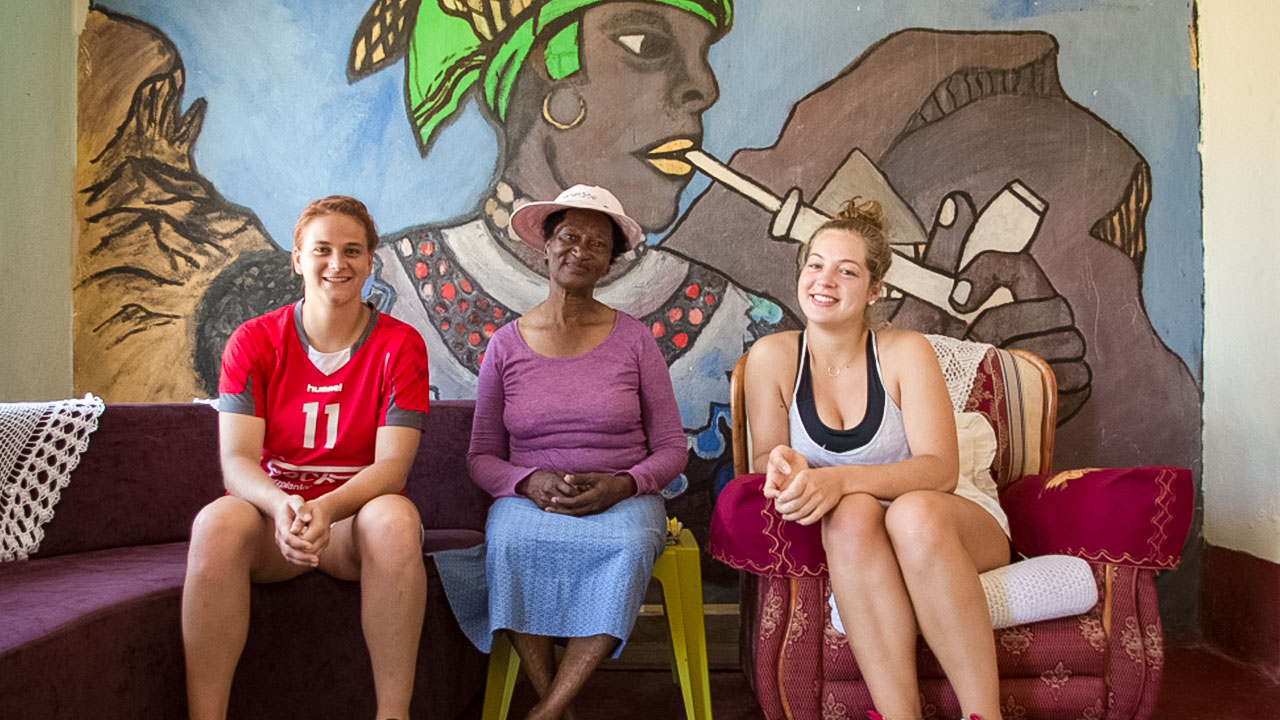
South Africa is a multi-lingual country with 11 official languages. Since 2023, sign language has also been recognised as an official language, so technically there are 12 official languages. These are English, Afrikaans, Zulu, Xhosa, Sepedi, Tswana, Southern Sotho, Tsonga, Swazi, Venda and Southern Ndebele. Although English is widely spoken, learning some useful and everyday words, phrases or sentences from the region where you are supporting a project can help you overcome cultural barriers and may even persuade community members to support you.
Although you may face challenges such as limited resources, poorly equipped facilities and economic inequalities in your work, remember that your expertise as a sports volunteer will be valuable to future generations in South Africa.
The basics: electricity, water, internet
Electricity
In rural areas, access to modern amenities is often limited, so expect basic facilities. Electricity in particular is a major problem in South Africa, and widespread power cuts have been a regular occurrence for some time. This is sometimes less acute in the larger cities than in the countryside. It is therefore a good idea to take a portable charger or power bank with you to keep your devices charged.
Water
You may also need to get used to using less water, as running water is sometimes limited. Water is scarce and not readily available everywhere. In general, the supply in South Africa is good, but there can still be limitations. Especially in rural or disadvantaged areas, the infrastructure is not always optimal. Instead of modern flush toilets, you may find outhouses. Not necessarily in the host family itself, but in the context of the project, for example on the sports field. Again, it is important to be flexible and adaptable.
Mobil network
In many countries and rural areas, it is not common to have Wi-Fi or Internet at home. Although the mobile phone network in South Africa is fairly well developed, access to the internet and mobile phones can be limited in remote areas. Be prepared for sporadic connections and adjust your communication expectations accordingly, e.g. if you want to call your friends or family back home.
Discover a multitude of flavours: a delicious journey through South Africa's diverse cuisine
Volunteering is not just about the work. It is also about engaging with the culture and immersing yourself in the local South African way of life. One of the best aspects is getting to know the local cuisine and eating habits. South African cuisine is varied and tasty, and you will probably have the opportunity to try many local dishes. Whether it is with your host family, at a barbecue – also called a “braai” – or privately in your free time.
Be prepared, however, that the diet may differ from what you are used to in Europe. Although fast food is common in South Africa and has become a staple food for many South Africans due to its low prices, South African supermarkets offer a variety of delicious treats in all shapes and forms.
As far as eating with a host family is concerned, you can discuss this directly with the family. Especially when it comes to allergies and intolerances. Gluten- and lactose-free products are usually only easy to find in large cities such as Cape Town and Johannesburg. The choice of ready meals is limited. However, there is a wide variety of fruit and vegetables. Remember that these products can be more expensive and your host family may not have the financial means to buy them.
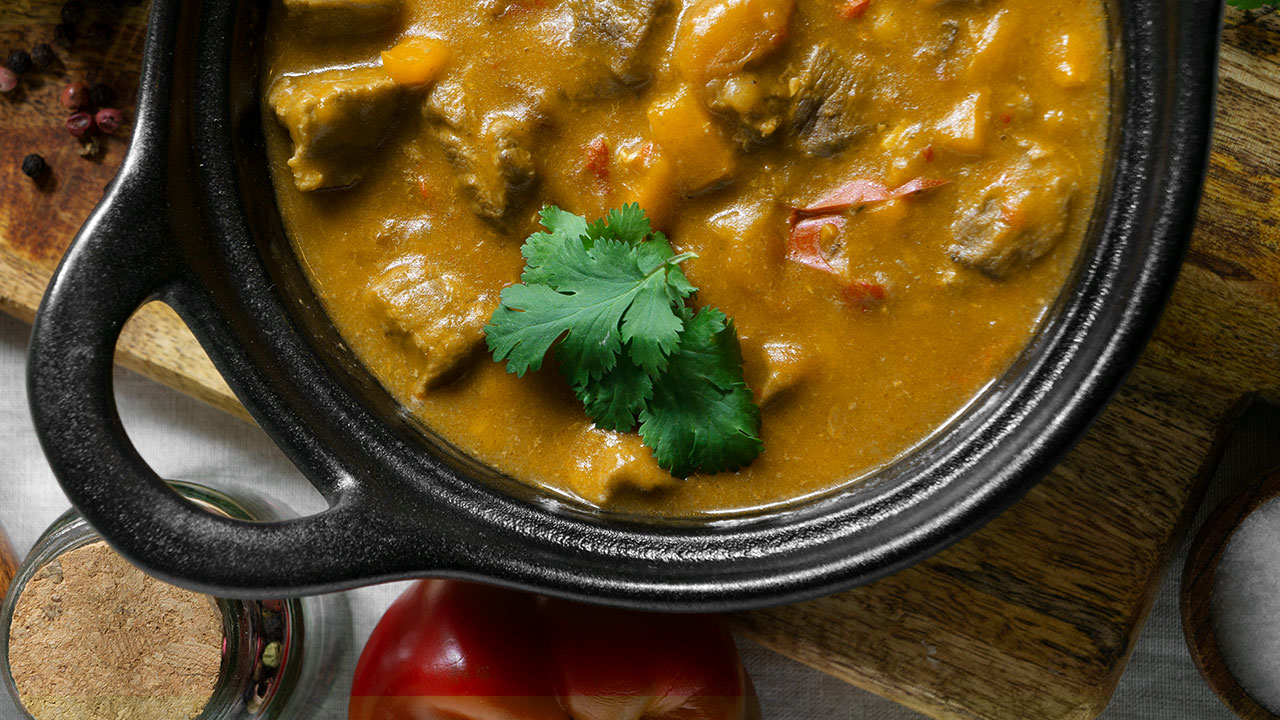
So get to know the local cuisine and feel free to help out in the family, cook something vegetarian or your favourite dish from home. Volunteering is also a cultural exchange.
Bobotie
…a classic South African favourite, is a baked casserole with often spicy, slightly sweet curry mince. It is often garnished with dried fruit such as sultanas or apricots and is usually served with vegetables and beans.
Pap
…also known as „Mieliepap”, is a cornmeal porridge, and a South African staple. It is often served with tomato and onion gravy or other traditional accompaniments.
Bunny cho
… from the Indian-influenced Durban area, is a loaf of bread stuffed with curry. It is an ideal street food and can be bought at local markets.
Potjiekos
…is a traditional South African stew, usually cooked slowly over an open fire in a three-legged cast-iron pot for several hours. Like stew at home, potjiekos can consist of a variety of ingredients including meat, vegetables and spices.
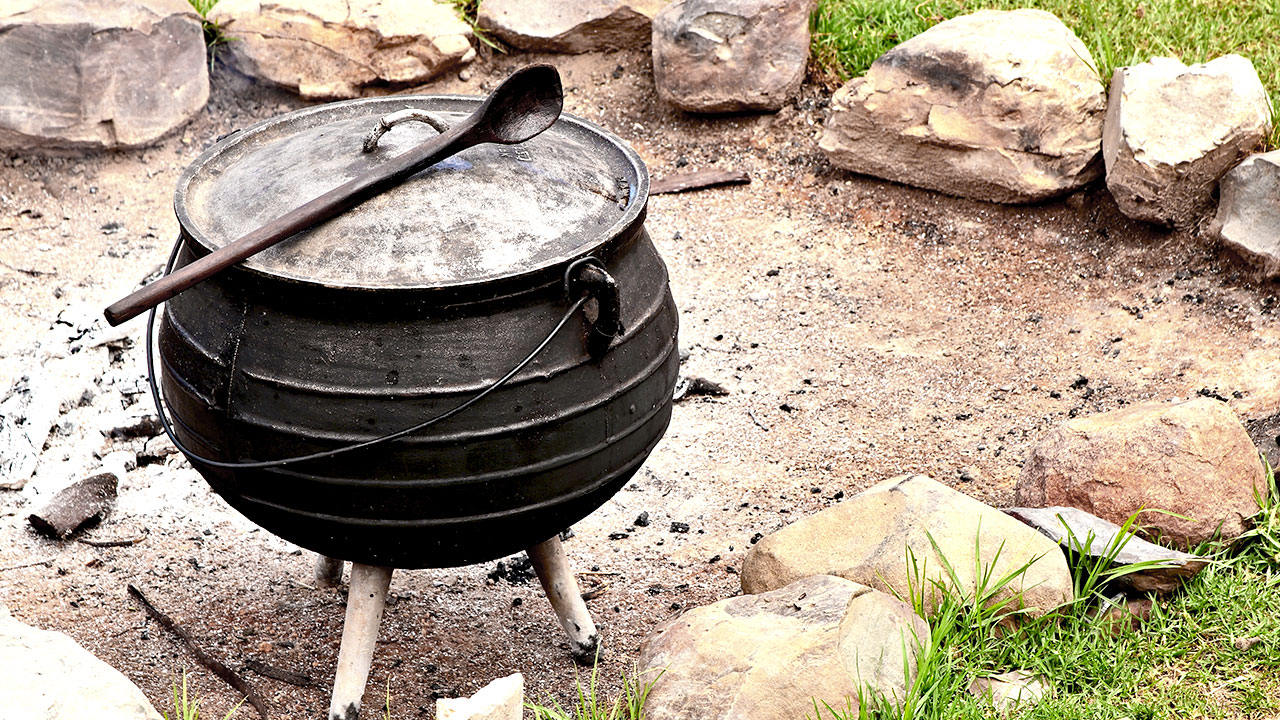
Vetkoek & boerewors rolls
South Africa is also known for its vibrant street food culture, which can be found in squares and parks, local markets and food stalls.
Vetkoek, for example, are deep-fried dough balls, often stuffed with savoury minced meat or sweet fillings such as syrup or jam. For a quick and tasty snack, try the boerewors rolls, which are grilled in a bun and served with dips such as tomato sauce and chutney.
Biltong & Droewors
South Africa is also famous for its cured meat snacks such as biltong and droewors. Biltong is dried, spiced beef or game meat such as kudu or springbok. Droewors is a type of dried sausage and is a popular snack everywhere.
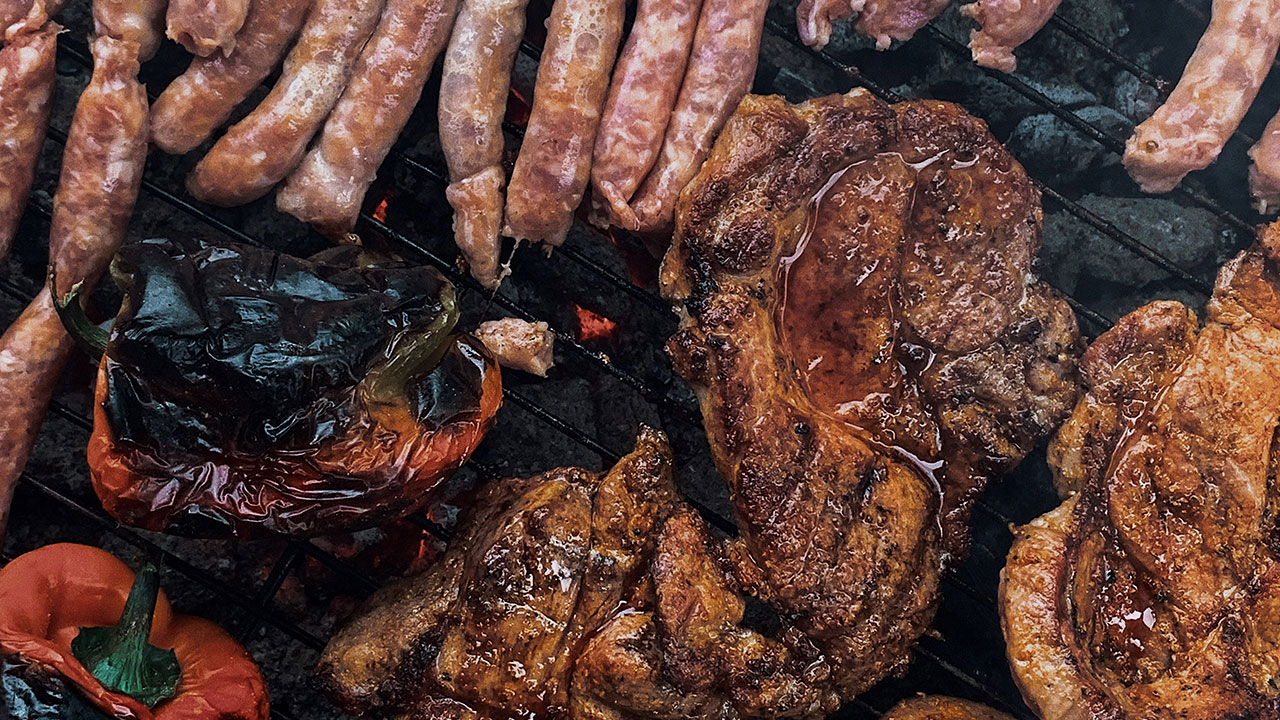
Braai
Barbecuing – better known as Braai – is something of a national sport. On public holidays, and especially on National Heritage Day, thousands of South Africans flock to the country’s many barbecue sites. Open flames and barbecued meat – not for vegetarians. But don’t worry, South Africans are now barbecuing vegetables too. Steaks, chicken and lamb chops are standard fare at a South African barbecue. These are accompanied by side dishes such as coleslaw and fresh bread.
Boerewors
…the deliciously spiced spiral sausages – are a South African barbecue favourite. Made from a mixture of beef, pork and the most popular local spices, they are grilled over an open fire. You simply have to try them!

Wine
While exploring South African cuisine, don’t forget to try the local drinks. South Africa has rightly boasted a thriving wine industry for years and there is a huge range of local wines to try. Whether you buy them in a liquor store or sample them at a wine tasting at one of the Cape’s many wine estates.
Rooibos tea
From wine to tea: Rooibos tea is a popular South African herbal tea known for its health benefits and naturally sweet taste. Rooibos grows exclusively in the south-west of South Africa and is served everywhere and at all times. It is very healthy and contains no caffeine or bitter or tannic substances.
As diverse as South African cuisine is, it is generally important to be aware of local customs and traditions when eating together. In many parts of South Africa, eating together is an important social event and it is customary to greet each other at the table. Especially with dishes such as porridge and pickled fish, people often eat with their hands. Make sure you practice good hygiene before eating.
Budgeting: cost of living, mobile internet and nightlife

Supermarkets & Spaza shops
There are a number of supermarket chains in South Africa, the most popular being Shoprite, Checkers, Pick n Pay, Woolworths and Spar. As at home, you will find a wide range of products, from local produce to international brands. Food prices in supermarkets are generally comparable to those in Europe. At least in the big cities like Cape Town and Johannesburg.
However, this is more of an average as some products such as milk or cheese are often more expensive than in European supermarkets, while other products such as fruit and vegetables are much cheaper. Fresh fruit and vegetables can be bought at local markets, which are not only cheaper but also support local farmers. Local street markets or small corner shops, often called “spaza shops”, can be found in many places in South Africa.
Mobile internet
…is relatively affordable in South Africa, thanks to a number of mobile operators. These include Vodacom, Telcom, MTN and Cell C. Pre-paid SIM cards are widely available and can be easily recharged with credit and data packages, either via the mobile phone or with a voucher code at one of the many outlets. A basic prepaid package with data can cost between ZAR 50 and ZAR 100 per month.
Many public places such as cafes, restaurants and shopping centres also offer free Wi-Fi. This is a convenient and cost-effective way to stay connected on the move without using up your data allowance.
Nightlife & restaurants
South Africa’s nightlife in major cities such as Johannesburg, Durban and Cape Town is diverse, offering a wide range of options from sports bars to hip clubs. It is relatively cheap compared to many Western countries. The cost of snacks and drinks will of course vary depending on the location and type. However, be aware that many bars and clubs charge admission, especially at weekends or during special events.
The range of restaurants to suit all tastes – from simple eateries to fine dining establishments – is so diverse that it is almost impossible to list prices here. They range from burgers, pizzas and traditional South African dishes to upmarket restaurants offering gourmet experiences.
Don’t forget to tip: It is customary to tip in South Africa. 10 to 15 percent of the bill is standard. Of course, this is up to you.
Navigating South Africa: Public transport, safety and local options
As a volunteer abroad it is important that you are familiar with the different forms of public transport. It doesn’t matter if you are travelling from A to B as part of your project or your host family, or if you want to travel to the next town in your free time.
South Africa’s roads are not known for being the safest. Both by day and by night. Whatever mode of transport you choose to use in South Africa, you should plan ahead and familiarise yourself with the routes, timetables and prices in your area before you set off.
Taxis
…called caps – are a convenient and common form of public transport in South Africa. They provide a door-to-door service and can be found in all major South African cities. In the past, the fare often had to be negotiated before the journey began, but this has now become easier thanks to the many e-hailing companies.
Not all areas have taxis. Especially in rural areas, public transport is limited or non-existent. Hitchhiking, getting a lift from a friend or colleague, cycling or walking are the only ways to get around.
E-hailing
There are several e-hailing companies in South Africa. The most popular are BOLT and UBER, which are widely used in South African cities. They offer a convenient, reliable and cost-effective alternative to traditional taxis. They allow you to easily find your driver and pay via an app using your credit card. Check locally to see what services are available.
With UBER, payment is mainly cashless via the app, making the process quick and convenient. Cash payment is also available in some areas. UBER offers different fare options with different vehicles to suit your preferences and budget. They may be a little more expensive than, say, a minibus, but they are safer and will get you from point A to point B.
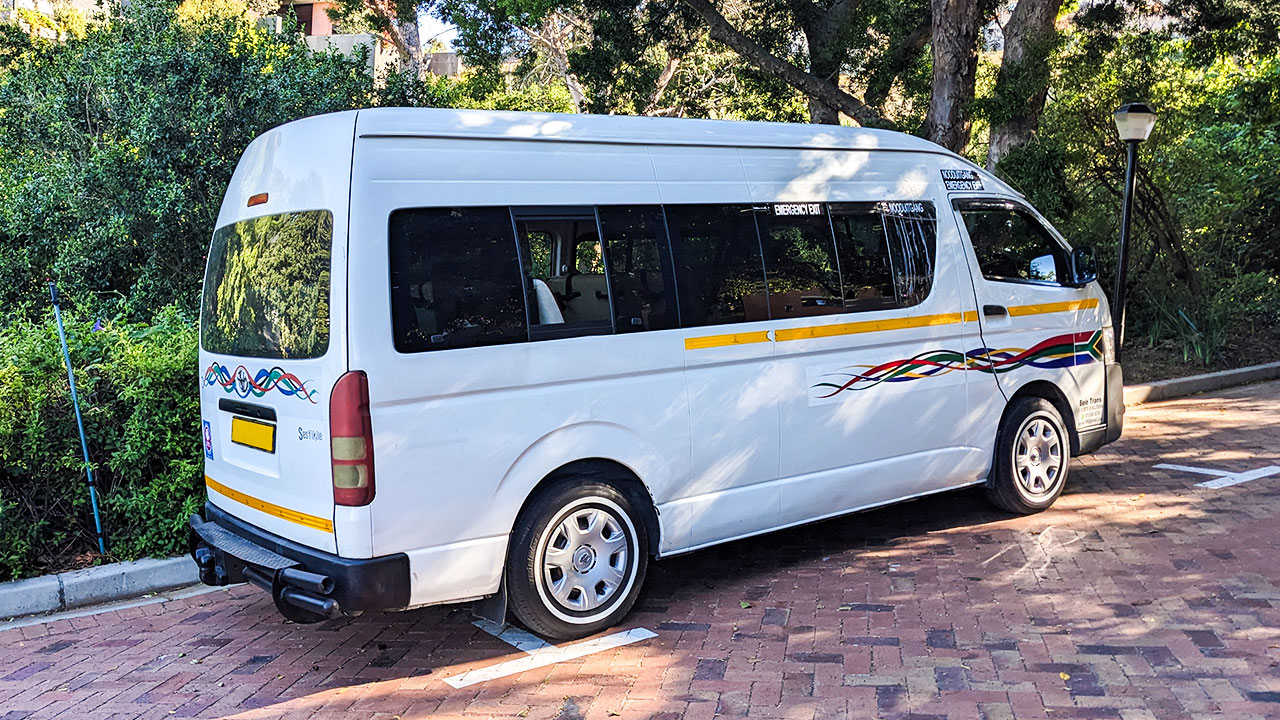
Minibuses
…often simply called taxis in South Africa, are a common form of transport and should not be confused with regular taxis. Like a swarm of bumble-bees, minibuses buzz back and forth between city centres and townships. Unfortunately, not always with the necessary consideration for other road users and often without a sense of speed. The driving style of some taxi drivers can be breakneck and dangerous.
Passengers usually wait at taxi ranks or are simply picked up at the roadside. Loud shouts are used to indicate where each minibus is going. There are usually fares for certain routes. Local minibus taxis often have no official signs or timetables. You may need to ask locals for directions.
Be prepared for a lively, noisy and sometimes “adventurous” ride. Make sure you have cash in small notes, change is not always available. And if a minibus taxi is full, it doesn’t mean it’s full. Passengers often sit close together. Although minibus taxis are popular and cheap, you should be wary of using them late at night or in areas that are considered crime-prone. In these cases, their use is generally discouraged. Again, it is important to familiarise yourself with your surroundings and local conditions. You should also ask your mentors and host family what is safe and what to look out for.
In the Cape Town area, MyCiti is a wheelchair accessible, modern and efficient bus system. To use the MyCiti system, you need a myconnect card, which you can buy at various stations or online. You will need to load credit onto the card, which you can then use to travel. You can use the card to check in when you get on and check out when you get off. MyCiti fares are reasonable and depend on the distance travelled. More info: www.myciti.org.za
The Bazbus offers a flexible way to explore South Africa and covers the main tourist destinations. The distinctive hop-on, hop-off system puts travellers in complete control of their journey. Whether you prefer a carefully planned week-long trip or a spontaneous adventure. The Bazbus is one of the most affordable ways to discover South Africa. More info: www.bazbus.com

In addition to local transport, there is also long-distance public transport. For example, you can take the Intercape bus from Cape Town to Johannesburg, which stops at many places along the way. Local airlines such as Flysafair also operate daily flights between the major central cities. More info: www.intercape.co.za
Alcohol: Volunteers have a responsibility too
Although the use of alcohol and drugs is widespread throughout the world, and South Africa is no exception, it is important to be aware of the rules and laws. Breaking these laws can result in fines, imprisonment or other legal consequences.
Alcohol plays an important role in South African culture during celebrations and rituals. From traditional beer brewed in rural communities to modern large-scale breweries and numerous world-renowned wineries, there is a wide variety of producers.
The legal drinking age in South Africa is 18. However, there is talk of raising this to 21. This age limit must be observed when purchasing and consuming alcoholic beverages. Underage drinking is illegal and may result in fines or other sanctions. Alcohol consumption in public places, such as beaches and parks, is prohibited.
When buying alcohol, make sure you buy it from licensed retailers, e.g. liquor shops. These shops are only open at certain times. So you can’t go to the kiosk in the evening to buy a bottle of wine for dinner. However, there is a wide range of non-alcoholic wines and beers that you can also buy in the supermarket. If you are attending a private event or meeting with your host family, for example, you should follow the host’s rules. You should also be aware of the situation in your placement and also in your host family. Alcohol consumption is not desirable in all families. This may not only be due to religious reasons.
Nevertheless, it is important to respect and recognise the cultural significance. In South Africa, it is not uncommon for people to drink alcohol in local shebeens, taverns or at outdoor gatherings. Many of these places are an integral part of the community as meeting places and places of exchange. Although it is important to respect this and not to judge or criticise hastily, alcohol abuse is also a big issue in South Africa. In general, however, it is no different than in European cities.
In general, the police have a zero-tolerance policy towards drink-driving. Especially around public holidays. There are strict laws and penalties for drink-driving in South Africa, ranging from hefty fines to licence suspensions and imprisonment. Just one large beer can put you over the drink-drive limit. Driving under the influence of alcohol is illegal and dangerous. When it comes to drunk driving deaths, South Africa has unfortunately been among the top 3 most dangerous countries in the world for years, not only in terms of road accidents in general.
As a volunteer in a sports project, you have the opportunity to set an example and promote a healthy lifestyle. Alcohol and drugs are not part of this.
Alcohol in particular is often trivialised. Alcohol and its consequences, such as domestic violence, are a big problem in South Africa. This is especially true in rural and disadvantaged areas. You should be aware of this and adjust your behaviour accordingly. You have a great influence on the children and young people in your projects and also in your family, which you are often not aware of.
Respect for religious diversity: Different rules and traditions in South Africa
South Africa is a country with many different religious and cultural traditions. As a volunteer in South Africa you may encounter different religious customs depending on the province you are working in. It is important to understand and respect these customs in order to build good relationships.
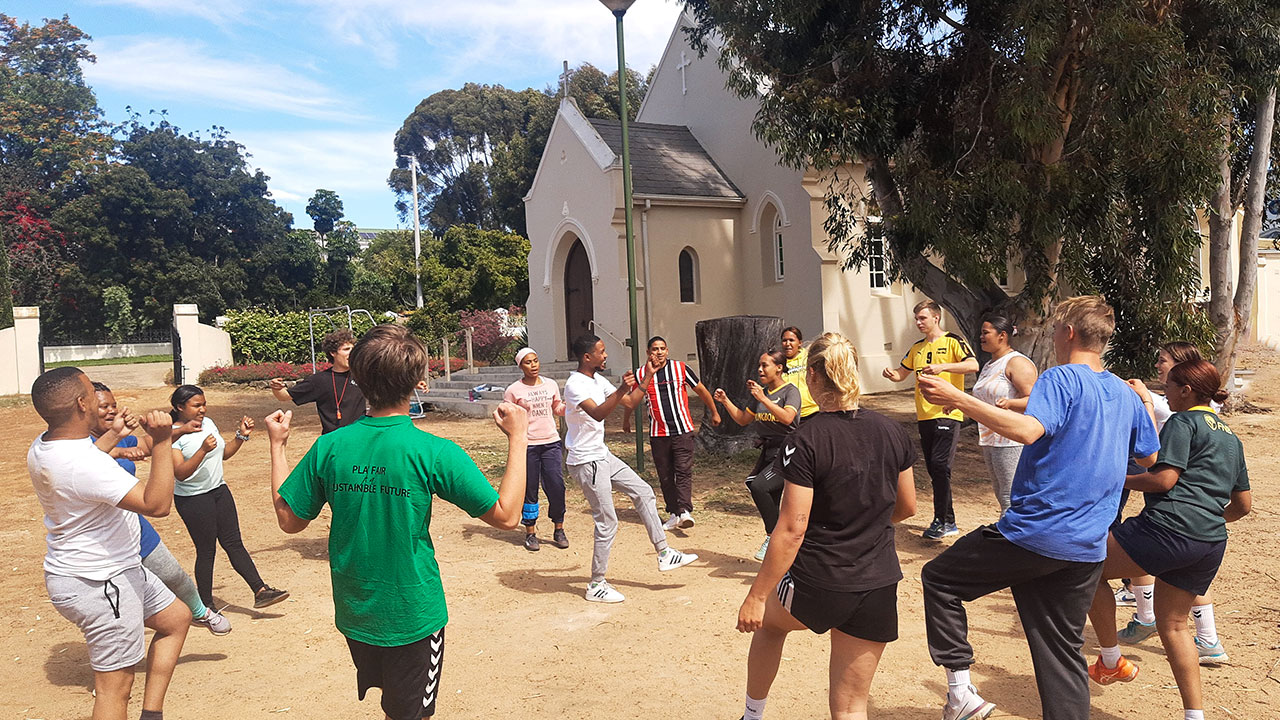
South Africa is divided into nine provinces, each with its own cultural, historical and religious influences. Understanding the religious characteristics of each province is key to effective and culturally sensitive volunteering.
Before you leave for South Africa, take time to learn about the religious customs in the province where you will be volunteering. This will help you to feel more comfortable in conversations and interactions with members of your community.
Most people appreciate the sincere interest and respect shown to them by strangers from other countries. Taking part in religious celebrations and festivals can be a good way for you to show respect and build community links.
Depending on the religious customs of different communities, it may also be advisable to dress appropriately, especially if you are attending Sunday services or cultural ceremonies with your host family.
- Western Cape: Christianity, Islam and traditional African religions are widespread.
- Eastern Cape: Traditional African religions predominate, but Christianity and Islam are also widespread.
- KwaZulu-Natal: Zulu culture and customs are strongly represented in this region, along with a mixture of Christianity, Islam and Hinduism. As a volunteer, it depends on the project and the location.
- Free State: The majority of the population is Christian, but there is also a growing Muslim community.
- Gauteng: With the capital Pretoria and the economic centre of Johannesburg, Gauteng is a diverse region with different religious communities including Christianity, Islam, Hinduism and Judaism.
- Limpopo: The northern province has a predominantly rural population that practices a mixture of Christianity and traditional African religions.
- North West: The province is predominantly Christian, but also has significant indigenous religious practices.
- Mpumalanga: This province is characterised by a rich cultural diversity and a mixture of Christian and indigenous religious practices.
- Northern Cape: This sparsely populated province has a mix of Christianity, indigenous religions and smaller religious communities.
Challenging South Africa's historic divisions: Volunteering for trust, unity and equality in communities
South Africa’s history is marked by segregation, apartheid and a long struggle for equality. Although much progress has been made since the end of apartheid, depending on your project location, you may still be confronted with the challenges of racism and co-existence in everyday life. This is true in both urban and rural areas.
Deep-rooted historical injustices, land dispossession and inequalities remain fundamental problems, leading to mistrust and sometimes hostility between black and white communities. In rural areas, access to resources is often unequal and black communities often lack basic services, education and economic opportunities. This unequal distribution leads to frustration and exacerbates tensions between different ethnic groups.
Finally, the politics of the country also play a crucial role. Political ideologies and ethnicity can lead to divisions along ethnic lines. Different political views then often lead to disagreement and conflict within communities.
In many rural areas or poor neighbourhoods, there is often a lack of opportunities for meaningful intercultural interaction, so racist stereotypes and prejudices are still widespread. This applies to both the white and black populations. These mutual prejudices can lead to misunderstandings and perpetuate racial divisions. Poverty and unemployment exacerbate these tensions.
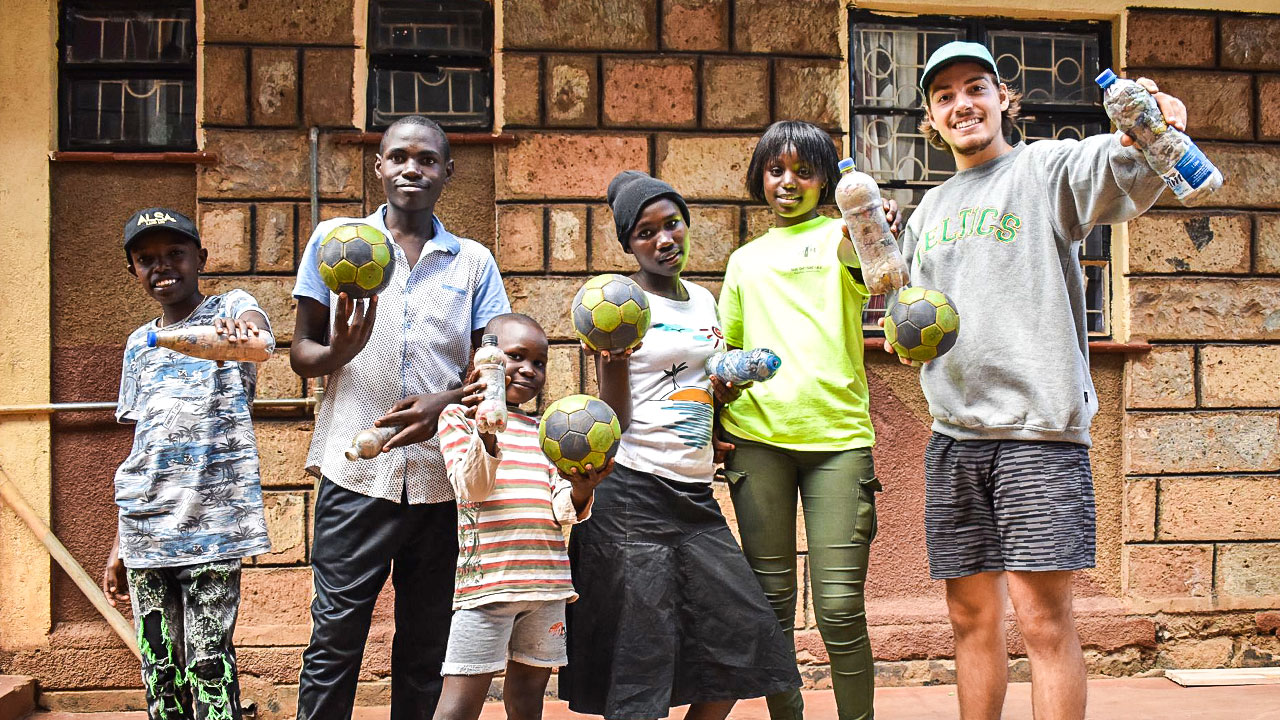
Differences between public and private schools also persist in education. These differences limit opportunities for personal development and economic advancement. Bridging the education gap is an important step towards a fairer society.
By volunteering abroad, you can not only help children and young people to lead more sustainable lives through sport, but also help to overcome these stereotypes. For more trust and unity.
Malaria: High risk areas and seasonal transmission in South Africa

Depending on your project location, we recommend that you consult your doctor or a tropical medicine institute about the risks and your personal precautions.
South Africa is a country with many different geographical regions. However, malaria occurs almost exclusively in the north-eastern regions of South Africa, particularly in the provinces of Limpopo, Mpumalanga and KwaZulu-Natal. Malaria transmission varies according to altitude, rainfall and temperature and is thus seasonal. It increases in October, usually peaks in January and February and decreases again towards May.
The most affected areas are the northern parts of Limpopo, including the Kruger National Park and adjacent areas. Malaria transmission is common in these areas during the rainy season. The Lowveld region of Mpumalanga, which includes parts of the Kruger National Park, is also a high-risk area during these months. In addition, the north-eastern coastal regions of KwaZulu-Natal, especially around the St Lucia Wetlands, are at risk.


